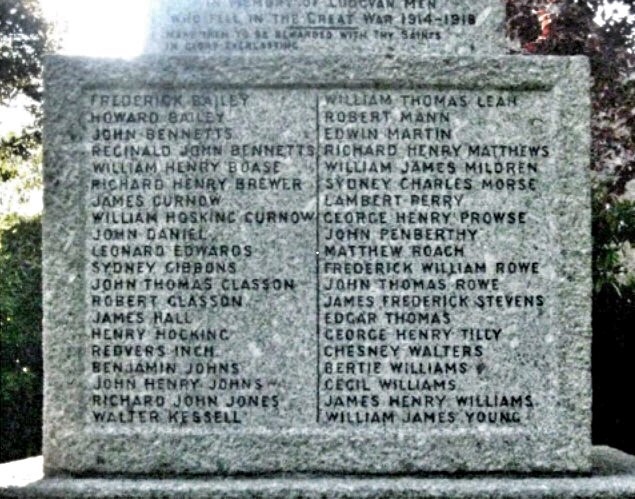Finding Private Walter

Over that past few years, my late Mum and I have been researching her family tree. She had her fathers' side done professionally in the 1980s but only as far as a few generations to the 1800s. I was so lucky to know my Grandma (Mums Mum) well into her 90s and we would sit for hours talking about the family, her own and her in-laws “The Jennings” from White Cross and Ludgvan in Cornwall. She even knew her great-grandchildren well. With the internet boom and those greatly inspiring family search TV programs, Mum and I decided, about 10 years ago, to dig deeper. My Mum lived abroad so there was many a phone call and checking up, emailing of photos from within her family, including asking her Mum for memories until she died. I remember finding a “Walter Kessell” on a photograph of a war memorial in Ludgvan, where all her fathers family were from. Large branches, most we knew from her “professional tree”. He MUST be a relative! Mum said she was sure he wasn't part of her family, not at all related to her paternal grandmother ( he would have been her great-uncle) No one spoke of him and he was not present on the professional tree she had bound in a booklet.
Even her Mum and older sisters didn’t know of him and they remember most of the family from the early 1900’s. We went no further. Sadly, my Mum passed away 5 years ago. It was pretty sudden, although she had been ill, she was only in her late 60s and it was so soon after my wonderful Grandma’s passing only 2 years earlier. Mum and Grandma were back together which was a comfort. I knew there was a red box… containing photos, scribbles of family trees, and names and even the professional tree she had drawn up along with duplicate certificates she had sent off for I had to have it and my Dad and sister bought it back for me. So, I began with this pandora's box, the start of my finding Walter for good. With all the public archives and scanned documents now available online, Walter Kessell cropped up again when looking at names/dates from her tree. There he was in a census from Ludgvan, with my Great Great Grandparents, his sister, my great grandmother, younger than him by 5 years and his other older sibling, brother Henry White.
I knew his father was an older man, married previously, losing his first wife in childbirth, so Walter had half brothers and sisters too. They were also recorded on the family tree we had but he was missing, probably due to limited online resources at the time. He appeared in a later census living just with his brother working as a gardener. I looked into war files and found his death files. Next of kin were indeed the names of my Great Great Grandparents in Ludgvan. His grave I traced to India, he was a Private in the Duke of Cornwall Light Infantry Regiment 2/4 battalion and didn’t come home… but why? I found medal issue documents, codes on them meaning “returned” and his war pension documents that went to his next of kin, including my Great Grandma Annie Margaret Jennings (nee Kessell, his sister) and his older brother Henry White Kessell. Dates for his parents showed his father died in 1915 after Walter went to war and his mother in 1919/1920… probably when the medals arrived in Ludgvan and his sister was married… surely his medals were not sent back for any reason that they didn't find a next of kin? It WAS ‘OUR’ Walter on the Ludgvan memorial! He DID exist, my vague early findings were right. Discovering a museum of his regiment, I wrote to The Cornish Regiment Museum in Bodmin, I had no photo or solid story other than the bones of the information I had found. I had a lovely reply from a volunteer there, including copies of a diary form an Orderly Room Sergeant that was in the 2/4th Battalion that Walter was in. Including photographs of the camp, men and even “A company” that Walter was enlisted. One of them could even be Walter. It gave a real insight to the journey from Truro, where he signed up in 1914 as a reserve and on to Salisbury Plain for training, then out to Karachi, Quetta and Delhi and right through to their demobilisation and leaving. Sadly, I knew, without “our Walter”. Emotional and excited from its detail, I saw Walters name listed. PTE WALTER KESSELL 20623 A COMPANY. He died on October 30th 1918 from Influenza. He would have been 24. Notes from this date explained 12 died from Influenza. I now know from a recent TV program there was a worldwide pandemic and India was hit hard as a country. The battalion Medical officer 'fought to save men” in the battalion camp, losing a few at first but the second attack on the camp was described as “epidemic magnitude, quoted from the diary with the Sergeant personally writing sympathies to the families of “the Influenza 12”.
On the 12th September 1919, a service was held in St James Church in Delhi to honour those who died during the war from the battalion, 39 listed in the diary notes, and a plaque unveiled. It states it was “an impressive service conducted by Canon F.C Buckwell, Chaplain of Delhi with bugles sounding the “Reveille” and the National Anthem” I was crying reading the old-fashioned typed document, so sad my Mum, who would have loved this story and be so proud of her Great Uncle she never knew, wasn't with me to uncover it all. She would have been SO proud. Since, I have sent for replica copies of medals from those listed on Walters issue card I found online and am trying to find a photograph somewhere, as well as other possible documents related to him. He didn't marry, have children or come home to his family but I was grateful he died with caring nurses and comrades around him in a bed, rather than young and torn apart on a muddy field alone, as many sadly did. I hope it was a little more of a peaceful end to his short life. Small blessings. But he has a story, for many years a silent one. It is my legacy, especially 100 years after his death this year (2018), to keep the story and memory of Private Walter Kessell alive for my family’s generations to come through my cousins and our children along with the memory of all those fallen in the wars, at any time across the world, away from their loved ones. I will be forever grateful to the museum, which I will continue to support who bought him to life for me. Remembrance Sunday has always been a big part of my childhood, from visiting the battlefields and cemeteries, seeing The Last Post at The
Written by his Great Great Niece Helen Brugts
This Remembrance Sunday marks the centenary of the end of WW1, and the cathedral will drop thousands of poppies to commemorate the lives lost. Visit our 'Message of Peace' page to find out how you can get involved and help us to create the thousands of paper poppies needed!

